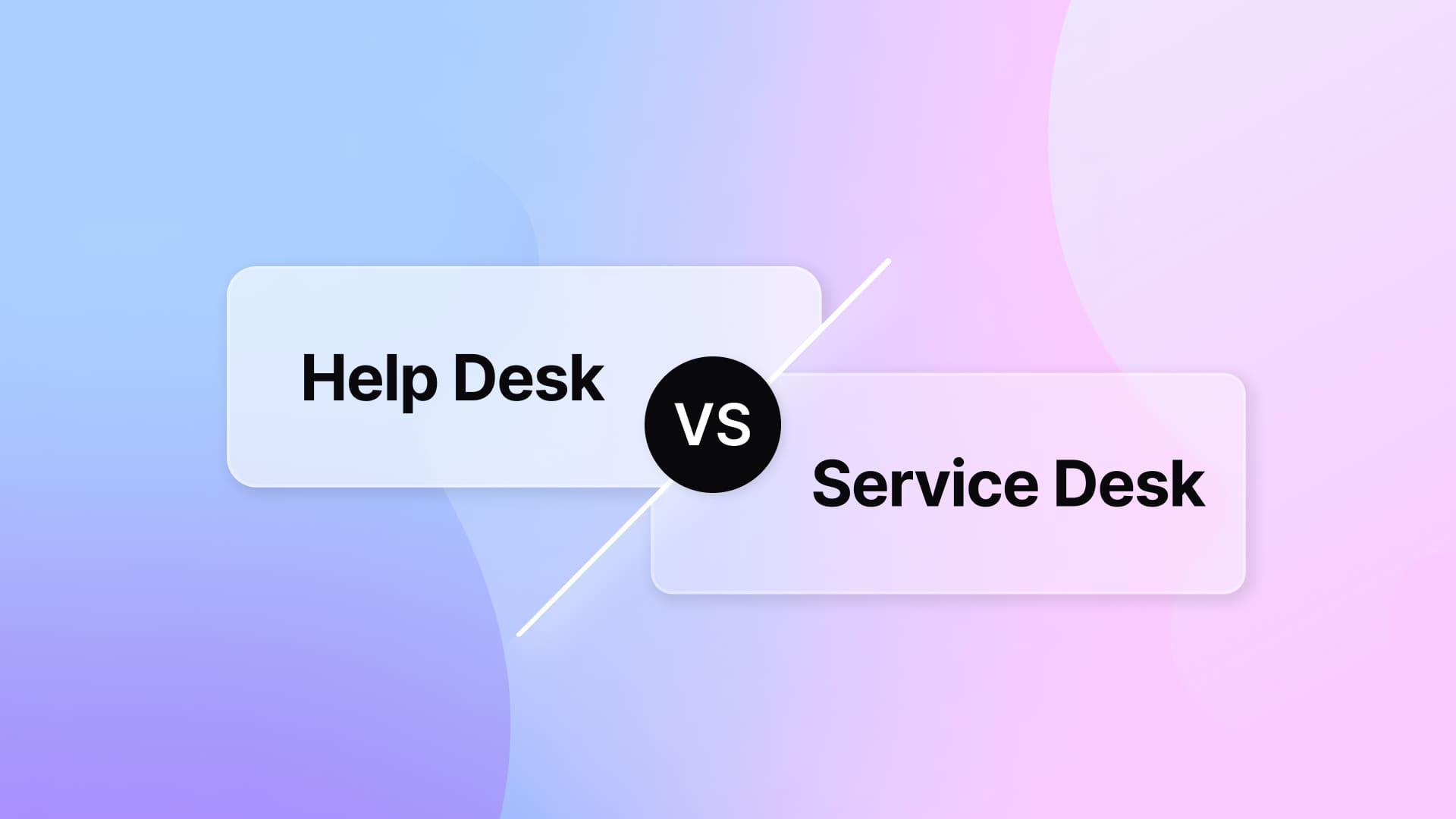Every company relies on the help desk skills teams have to keep operations running smoothly. The ability to diagnose issues, resolve user concerns, and manage systems effectively forms the backbone of their work. However, the demands on help desk personnel extend beyond technical know-how; interpersonal skills and adaptability are just as vital.
Over the last decade, the IT service desk has transformed dramatically. Evolving technology, remote work, and shifting employee expectations have brought new challenges and responsibilities. These changes have arrived at a pace that can surpass traditional skill development, requiring help desk agents to adapt quickly. The result is a profession that not only supports but also anticipates the needs of modern business operations.
To help, this blog outlines all the key skills an IT help desk agent needs to deliver the service and support experiences that their organization and its employees need.
What are help desk skills?
Help desk skills refer to the abilities and expertise required to provide effective IT support. These skills enable technicians to address technical issues, assist users, and maintain IT systems. They encompass a mix of technical knowledge, interpersonal abilities, and problem-solving strategies. Without these capabilities, even the most sophisticated IT infrastructure can falter under the weight of user frustration and unresolved issues.
The scope of help desk skills includes everything from basic troubleshooting to advanced system administration. They form the backbone of IT support, making it crucial for organizations to prioritize the development of these competencies within their teams.
What does a service desk agent do?
Service desk agents serve as the first point of contact for users experiencing technical difficulties. Their role involves a mix of troubleshooting, documentation, and user education. Here’s a closer look at their primary responsibilities:
-
Diagnosing technical issues: Agents perform root cause analysis to understand the origin of hardware, software, or network problems.
-
Resolving user queries: They guide users through solutions for common issues, either remotely or in person.
-
Escalating complex problems: When an issue requires specialized knowledge, agents escalate tickets to higher-tier support.
-
Documenting incidents: Accurate records are crucial for analyzing patterns and improving IT systems.
-
Providing training and guidance: They empower users by teaching best practices and preventative measures.

Help desk skills
A well-rounded help desk technician possesses a blend of hard, technical, and soft skills. Each category plays a unique role in delivering effective support.
Let's see a recap of the in-demand skills for technical support agents:
Hard skills
Hard skills are measurable technical abilities that form the foundation of IT support:
-
Operating system knowledge: Expertise in Windows, macOS, and Linux environments.
-
Networking basics: Understanding of IP addresses, DNS, and network configurations.
-
Hardware Management: Skills in diagnosing and repairing devices like laptops, printers, and routers.
-
Application support: Proficiency in common software tools, including Microsoft Office and email clients.
In the early days of help desk support, hard skills primarily revolved around basic troubleshooting of hardware and standalone software.
However, as technology has grown more interconnected and organizations increasingly rely on IT systems for every aspect of their operations, the demand for broader and deeper technical proficiency has surged. Help desk technicians should have a strong understanding of computer systems, computer hardware, networking concepts, and software applications.
Knowledge of operating systems was once limited to a single platform (the one chosen by the organization) but now requires familiarity with diverse environments like Windows, macOS, and Linux to accommodate heterogeneous networks and end-user preferences.
Networking skills are indispensable as businesses embrace cloud computing and distributed workforces. Understanding concepts such as IP addressing and DNS ensures technicians are quick in resolving technical issues swiftly. The support technician is responsible for minimizing disruptions in an era when even a brief outage can impact productivity and revenue.
Furthermore, ITIL or broader IT Service Management frameworks further contextualize these skills by introducing structured approaches to service delivery, allowing technicians to align their work with business objectives and prioritize tasks effectively based on impact and urgency.

Technical skills
Technical skills go beyond foundational knowledge, focusing on advanced IT capabilities:
-
System administration: Managing user accounts, permissions, and server configurations.
-
Cybersecurity awareness: Identifying and mitigating risks like phishing and malware attacks.
-
Troubleshooting methodologies: Applying systematic approaches to resolve complex issues.
-
Remote support tools: Using platforms like TeamViewer or AnyDesk for remote assistance.
-
Database management: Basic knowledge of SQL and database structures.
Historically, IT roles focused on reactive problem-solving, but today’s technical demands emphasize proactive and preventive measures. Incident management, once a straightforward process, has evolved into a critical function that not only resolves issues but also uncovers patterns and root causes to prevent future disruptions. Similarly, as organizations adopt more sophisticated systems, the ability to diagnose complex issues quickly has become essential to maintain business continuity.
Cloud computing and automation tools reflect the shift towards scalability and efficiency in modern IT environments. Platforms like AWS and Azure have redefined infrastructure management, requiring IT personnel to learn new skill sets to optimize resources and manage costs.
Meanwhile, the increased sophistication of cyber threats underscores the importance of cybersecurity protocols, as organizations must protect sensitive data while maintaining compliance with regulations.

Soft skills
Soft skills enable technical support agents to communicate effectively and build trust with users:
-
Active listening: Fully understanding user concerns before proposing solutions.
-
Empathy: Recognizing and addressing the frustrations of non-technical users.
-
Time management: Balancing multiple tickets and prioritizing urgent tasks.
-
Clear communication: Explaining technical concepts in a way that’s easy to grasp.
-
Adaptability: Staying calm and resourceful in high-pressure situations.
IT support is sometimes viewed as purely technical, but we can't stress enough how important communication skills are for a role so reliant on human interaction.
If you’ve had a chance to look at the ITIL 4 service desk practice, then you’ll have seen that it’s focused on “engagement” rather than the mechanics of incident management – recognizing the people-based, rather than technology-based, role that IT support personnel need to perform.
Soft skills like active listening and empathy have become indispensable as users, often frustrated or stressed, need more than technical fixes. Effective communication and a user or customer-centric approach are necessary so that they feel understood and reassured, even when facing complex issues.
The shift to remote and hybrid work environments has further amplified the need for adaptability. Technicians must navigate varied communication channels, from video calls to chat platforms and adjust their approaches to suit the situation. Moreover, the rising complexity of IT systems means technicians frequently deal with high-pressure scenarios, requiring exceptional time management and the ability to prioritize urgent tasks without compromising quality.
Unlocking Career Progression
Discover the strategies to lifelong learning and evolvement in IT
Download for free
Business understanding needs to extend to value
While the skills we mentioned, such as problem-solving, communication, and technical proficiency, are foundational, we'd like to add one more: the need for IT personnel to understand the broader business context.
We could say that traditionally, IT personnel had to understand the business environment — or at least the parts that they served and supported. This could include key personnel, locations, terminology, products, applications, and other similar “elements.” That minimum context allowed them to understand when employees presented their IT issues and requests.
But here's the thing: nowadays, this level of business understanding is no longer enough to provide the level of IT support that the business and its employees expect. Now, instead, there’s a need to understand how value is created by different parts of the business such that IT support personnel can better understand how IT issues, and the quality of the support they provide, impacts both business operations and outcomes.
As a minimum, this plays a key role in understanding the relative priorities – based on impact and urgency – of IT issues and allowing support personnel to better understand issues from the end-user AND business perspective.
This need is called out in the ITIL 4 service desk practice using the term “service empathy” –
“The ability to recognize, understand, predict, and project the interests, needs, intentions, and experiences of another party in order to establish, maintain, and improve the service relationship.”
To truly engage with the people they serve, IT support personnel must do more than blindly follow the old, dusty service desk scripts. Instead, they need to be able to work using their own initiative to tailor their approach to suit the situation at hand, demonstrating flexibility and the ability to deal with non-standard scenarios.

How to improve your service desk skills
Now that you have learned more about the role and today's requirements let's talk about enhancing your help desk skills. This will involve continuous learning and practice. Here’s how you can grow:
-
Seek certifications: Industry-recognized credentials like CompTIA A+, ITIL Foundation, or Microsoft Certified: Azure Fundamentals validate your expertise and open career opportunities. There are also specific service desk certifications from organizations like HDI, SDI, and ITIL.
-
Participate in training programs: Online courses, workshops, and webinars offer targeted learning in areas like cybersecurity, networking, and system administration.
-
Practice problem-solving: Regularly challenge yourself with real-world scenarios to improve troubleshooting techniques.
-
Stay updated: Technology evolves rapidly, so keeping up with the latest trends and tools is vital. Follow industry blogs, forums, and news sources.
-
Request feedback: Constructive input from colleagues and supervisors can highlight areas for improvement and build your confidence.
-
Develop soft skills: Join public speaking groups, attend customer service workshops, or engage in team activities to strengthen communication and interpersonal abilities.

Help desk technician resume must-haves
A well-crafted resume can set you apart in a competitive job market. Highlight these elements to showcase your suitability for a help desk role:
-
Technical certifications: Include relevant credentials to demonstrate your expertise. A relevant degree for an aspiring help desk technician is a Bachelor of Science in Computer Science.
-
Work experience: Detail previous roles and accomplishments, focusing on measurable achievements and technical assistance KPIs (e.g., “resolved 95% of tickets within SLA”).
-
Key skills: List both technical and soft skills that align with the job description.
-
Education: Mention degrees or diplomas in IT-related fields.
-
Tools and technologies: Specify familiarity with help desk software, remote support tools, and ticketing systems.
-
Projects: Include examples of initiatives you’ve led or contributed to, such as system upgrades or process improvements.
Remember to organize your resume with clear headings and bullet points to ensure readability. For the best results, tailor each application to the specific role.
In our podcast, Ticket Volume, we discussed resume writing for IT professionals with Robert Fedoruk. He highlighted the importance of reflecting on your current abilities and understanding why they are relevant.
For instance, knowing how to use nuts and bolts is a start, but as our guest puts it, “Did you build yourself a little workbench, or did you fly a shuttle to the moon?”
The key is to clearly demonstrate how you have applied your skills and the outcomes you have achieved. Additionally, Fedoruk also mentioned the significance of soft skills in IT. As we previously stated, although the job is often technical, a balance of both hard and soft skills is crucial for success in the field.
Service desk agent salary expectations
Service desk agent salaries vary based on experience, certifications, and location. Here’s an overview of help desk agent salary expectations in the US:
-
Entry-level positions:
-
The average entry-level salary for service desk agents is approximately $22,525 annually, with a range from $19,000 to $30,000.
-
-
Mid-level roles:
-
Service desk technicians with 3-6 years of experience typically earn around $24,629 per year. Mid-career salaries can range from $45,000 to $60,000, reflecting the agent's growing expertise and responsibilities
-
-
Senior technicians:
-
Senior service desk agents, who usually have over 7 years of experience, can expect to earn about $26,351 on average annually. In some cases, salaries can exceed $65,000 to $80,000, especially in high-demand areas or specialized roles.
-
In addition to base pay, many organizations offer benefits such as health insurance, retirement plans, and professional development opportunities. Some companies also provide performance-based bonuses, which can significantly enhance total compensation.
Conclusion
The demands placed on technical support teams today go far beyond troubleshooting and ticket resolution. Success in this field requires a multifaceted skill set that balances technical expertise, human interaction, and strategic insight. Hard skills provide the foundation for providing technical assistance, while technical and soft skills ensure the support specialist can tackle complex problems and communicate effectively with users.
Continuous improvement ties these skills together, creating a framework for IT teams to adapt and thrive in a rapidly changing environment. Not all service desk roles are the same, but as an agent or aspiring agent, you can stand out by focusing on adaptability and building a strong foundation in Service Management.
When you truly understand the core principles and processes (and even common challenges) behind service desk operations, you position yourself to do more than just solve technical problems — you can actively improve workflows, anticipate user needs, and enhance the service delivery overall.















